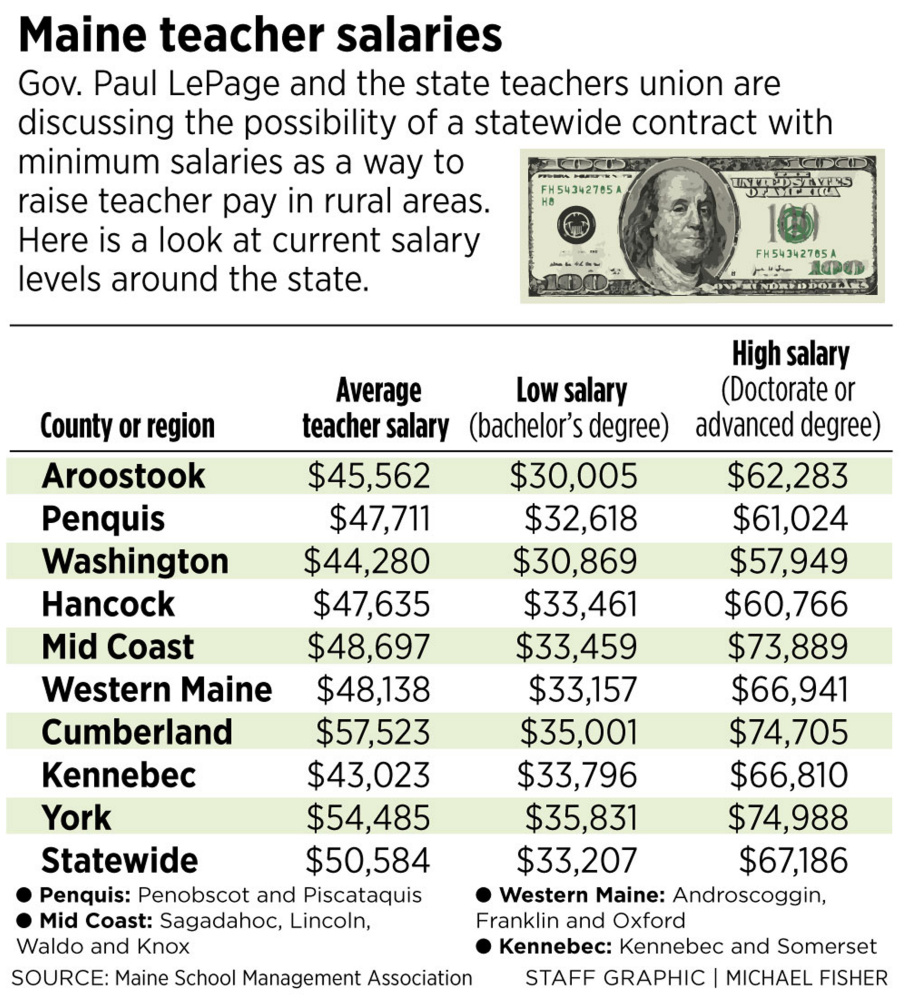AUGUSTA — The head of the Maine Education Association said the teachers union is “happy to talk about the concept” of a statewide teacher contract, but she stopped short of endorsing Gov. Paul Le- Page’s proposal.
LePage is pushing for a statewide teacher contract as part of the ambitious overhaul of Maine’s K-12 funding formula that he included in his two-year budget proposal. By acting as the collective bargaining agent for all schools, LePage argues, the state could set a minimum salary that raises teacher pay in rural Maine, thereby helping communities attract and retain well-trained younger educators.
“We need to get them into the classroom,” LePage said during his State of the State address Tuesday. “We can do it by having a statewide teachers contract and paying what they’re worth.”
Other aspects of LePage’s education funding agenda – such as his proposals to repeal the Essential Programs and Services funding formula and to halt state support for school administration – are unlikely to survive the legislative process.
But the Maine Education Association isn’t rejecting outright the idea of a statewide teacher contract. MEA President Lois Kilby-Chesley said she was encouraged that LePage told MEA leaders last Friday that he wanted the union’s feedback before crafting a specific proposal.
“What we said is, ‘We are always willing to sit and talk to you,’ ” Kilby-Chesley said, recounting the MEA leaders’ first meeting with LePage since 2013. She described the meeting as “respectful,” but said the group also stressed that “at the end of the day, we may go down two different roads.”
“We are happy to talk about the concept of it. Whether or not we are able to come to any agreement depends,” she said.
OBSTACLES TO STATEWIDE CONTRACT
As part of his $6.8 billion budget, LePage proposed that the state no longer pay any share of local administration costs. Instead, the governor wants to use financial incentives to encourage Maine’s 140-plus school districts to consolidate or regionalize. The statewide teacher contract would be part of an as-yet-unspecified, new education-funding formula providing money for “direct instruction and support for student learning.”
Maine’s size and economic diversity would pose significant challenges for efforts to craft a single statewide contract. Also, past efforts in other states have raised concerns about local control.
It’s also unclear if last Friday’s meeting could signal a thaw between the MEA and LePage, who last year labeled the union “the worst organization in the state of Maine.” Although stressing he has no problems with Maine teachers, LePage often accuses the MEA and other labor unions of trying to impose their liberal – and now “socialist” – ideologies on the state.
For his part, LePage struck a cautiously optimistic tone during his State of the State address.
“We have a long ways to go but they really like the concept,” LePage said of his meeting with MEA leaders. “Don’t know if it can work as one state contract. It might be eight contracts, it might be district contracts. I don’t know. But I told them … there’s no sense moving forward with it unless they are on board.”
MAINE PAY RANKS 33RD NATIONALLY
Kilby-Chesley said the governor did not mention the options of regional or district contracts during the meeting. She plans to solicit feedback from members statewide on the positives and negatives of a statewide contract to inform the MEA board’s position.
According to federal statistics, the average salary for elementary and secondary teachers in Maine was $50,229 in 2015-16, putting the state at 33rd nationally. The national average was $58,064 and Maine’s average teacher salary was well below all other New England states, according to the National Center for Education Statistics.
Currently in Maine, each school district or town negotiates teacher compensation separately, resulting in large disparities between communities.
For instance, the average salary in the Kennebec region (which includes some towns or school districts outside of Kennebec County) during the 2015-16 school year was just over $43,000, while the average in the Cumberland region was $57,500. That’s a difference of $14,500, or 33 percent, according to an analysis of Maine School Management Association data.
While Rhode Island, Washington and several other states have been exploring statewide teacher contracts, Hawaii is the only one with a truly statewide collective bargaining agreement. Seventeen states, however, have statewide teacher compensation “schedules” that essentially set minimum salary levels for teachers depending on their level of education and years of classroom experience, according to a 2016 analysis by the nonprofit Education Commission of the States.
Many school districts can and do pay teachers more than the minimum set by the schedule. But the schedules help smooth out the pay differences that can put smaller, poorer or more rural districts at a competitive disadvantage when recruiting and retaining teachers.
“While a salary schedule alone cannot equalize teacher pay, it can help to close the gap between the highest-paid and lowest-paid teachers in the state,” the commission’s analysis states. “A schedule can help to achieve this goal by ensuring that every district in the state provides their teachers with a salary that is at least competitive with that of other districts in the state.”
LOW PAY HAMPERS RURAL SCHOOLS
The disparity in Maine often falls along rural-urban or wealth lines.
The lowest salary for teachers with a basic bachelor’s degree working in many districts in Washington and Aroostook counties, for instance, was less than $30,000 last scholastic year. Teachers with the same level of education in York or the Ogunquit-Wells Community School District, meanwhile, earned at least $42,475, according to the Maine School Management Association data.
Factors such as regional differences in the cost of living clearly play into such disparities. But LePage said such pay gaps make it difficult for smaller, rural schools to attract and keep young, talented educators.
“If they are good, wealthy towns come after them and then they are gone in about three years,” LePage said.
The LePage administration plans to introduce legislation allowing the state to act as the collective bargaining agent for a statewide teacher contract.
The MEA has taken a strong stance against many aspects of LePage’s budget. The union’s leadership also has strongly criticized the governor for his proposal to reverse the voter-approved 3 percent tax surcharge on Mainers earning more than $200,000 that aims to funnel more money into public schools.
Kilby-Chesley said she was pleased, however, to hear the governor’s passionate statements on higher teacher compensation.
“We have been saying that for a long time, so that is one of the things that the governor and I agree on,” she said. “We need to pay teachers more. How we get to that may be where we differ.”
Kevin Miller can be contacted at 791-6312 or at:
Twitter: KevinMillerPPH
Send questions/comments to the editors.




